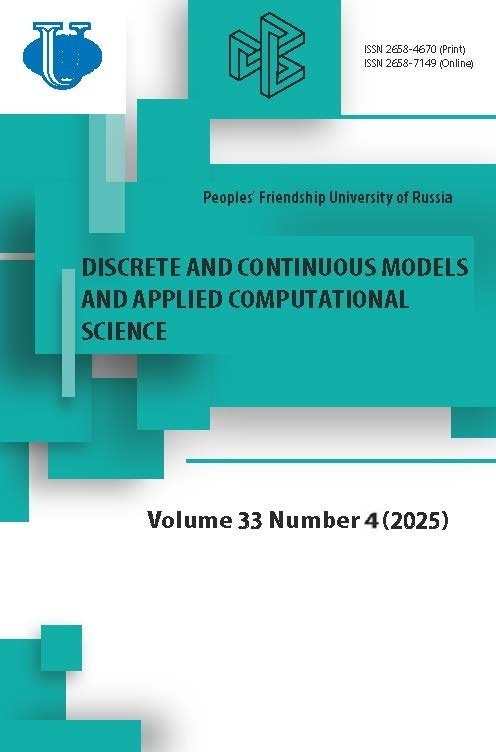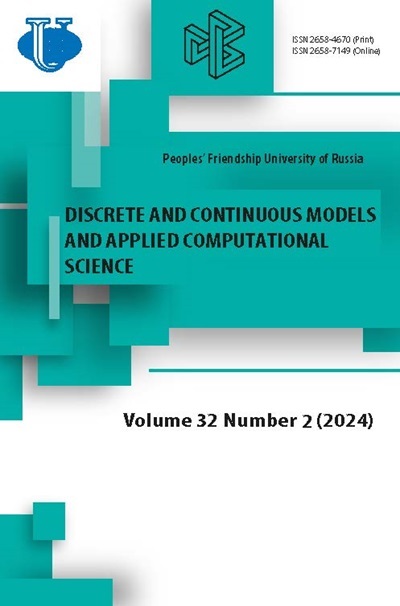Marginal asymptotic diffusion analysis of two-class retrial queueing system with probabilistic priority as a model of two-modal communication networks
- Authors: Nazarov A.A.1, Fedorova E.A.1, Izmailova Y.E.1
-
Affiliations:
- National Research Tomsk State University
- Issue: Vol 32, No 2 (2024)
- Pages: 140-153
- Section: Articles
- URL: https://journals.rudn.ru/miph/article/view/41384
- DOI: https://doi.org/10.22363/2658-4670-2024-32-2-140-153
- EDN: https://elibrary.ru/CRYMNN
- ID: 41384
Cite item
Full Text
Abstract
In the paper, a retrial queueing system of \(M_2/M_2/1\) type with probabilistic priority and interruptions is considered as a model of a two-modal communication network. Two classes of customers come to the system according Poisson arrival processes. There is one service device (or channel). If a customer finds the server occupying by a customer of the same class, it goes to an orbit and makes a repeated attempt after a random delay. If an arrival customer finds the other class customer on the server, it can interrupt its service with the given probability and start servicing itself. Customers from the orbit behave the same way. There is a multiply access for customers in the orbit. Service times and inter-retrial times have exponential distributions. Customers are assumed heterogeneous, so the parameters of the distributions are different for each class. In the paper, we propose the original marginal asymptotic-diffusion method for finding of the stationary probability distributions of the number of each class customers under the long delays condition.
Full Text
1. Introduction Heterogeneous of information is characteristic of modern telecommunication networks. Transmitted data may contain text, sound, image, service information, etc. Thus, we observe several arrival processes in networks with different characteristics (required job, quality of service, permissible latency, possibility of losses). In the field of robotics and telemedicine, multimedia networks are called as multimodal communication [1]. Interest in multimodal systems is increasing with the development of multimodal interfaces. By modality it is called physically recorded elements of communication (human-machine and/or human-human), including both the transmitted data (message) and individual information. The set of multimodal data and their size may vary depending on the task. So, in speech recognition systems based on audio recordings, it is sufficient 70-80 Kb for a speech modality [2], while for a sign modality (i.e. in Russian sign language), one modality record can require 125 Mb [3]. One of solutions to ensure the quality of data transmission is to distribute user application data into several sub-streams and to provide multi-stream data transmission using several available communication interfaces. Often some modalities may be different by priority [4]. It means that some information is more significant than other in a particular task (i.e. urgent emergency messages must be delivered immediately that leads to interruption of lower priority information transmission). Most of the works devoted to the problems of multi-stream data transmission are based on the analysis of data transmission quality parameters using simulation models. Here, the mathematical modelling is applied for analyzing and optimization of multimodal data transmission systems, taking into account the priorities, interruptions and the existence of repeated attempts of information transmission after fails. In this way, we propose the mathematical model of multimodal communication system in the form of a retrial queueing system with two classes of arrivals and opportunity of interruptions in the case of probabilistic priority. Retrial queueing systems (or queueing system with repeated calls) [5, 6] are new class of queuing models widely applied in various communication systems (call-centers, cellular networks, LANs, etc. [7, 8]). In retrial queues, there is a some virtual place (the orbit) for repeated calls, where unserved calls wait during random time before an attempt to receive service again. In spite of the large number of studies of retrial queueing systems of various configurations, heterogeneous models are weak investigated. Retrial queues with several types of customers (and several orbits too) are called as multiclass RQs and considered in [9-15]. Most of cited papers are devoted only stability analysis, while probability distributions or even means of processes under study are hardly investigated. Queuing models with interruption are proposed in [16, 17]. Different types of service interruptions are described in [18]. Queuing systems with probabilistic priority are presented in [19, 20]. Retrial queues with different types of priority are studied in [8, 21-23]. The most close study of retrial queues with two classes and priority are considered in [24, 25]. The rest of the paper is organized as follows. In Section 2, the mathematical model is described, the process under study is denoted and a system of differential Kolmogorov equations is written. In Section 3, we propose the original marginal asymptotic-diffusion analysis method for the two-class retrial queueing system studying. We derived the formula for the marginal asymptotic stationary probability distribution of number of each class calls in the orbit under the long delays limit condition. Section 5 consists some conclusions. 2. Mathematical model Let us consider a retrial queueing system with two classes of customers. A customer of theAbout the authors
Anatoly A. Nazarov
National Research Tomsk State University
Author for correspondence.
Email: nazarov.tsu@gmail.com
ORCID iD: 0000-0002-5097-5629
Scopus Author ID: 7201780364
ResearcherId: O-5862-2014
Doctor of Technical Sciences, professor of Department of Probability Theory and Mathematical Statistic
Izmailova National Research Tomsk State University, 36Ekaterina A. Fedorova
National Research Tomsk State University
Email: moiskate@mail.ru
ORCID iD: 0000-0001-8933-5322
Scopus Author ID: 56439120600
ResearcherId: E-3161-2017
PhD in Physical and Mathematical Sciences, associate professor of Department of Probability Theory and Mathematical Statistic
Izmailova National Research Tomsk State University, 36Yana E. Izmailova
National Research Tomsk State University
Email: evgenevna.92@mail.ru
ORCID iD: 0000-0002-9132-0127
Scopus Author ID: 57191051392
ResearcherId: T-6377-2017
PhD in Physical and Mathematical Sciences, associate professor of Department of Probability Theory and Mathematical Statistic
Izmailova National Research Tomsk State University, 36References
- Al Jaafreh, M. Multimodal systems, experiences, and communications: A review toward the tactile internet vision. Recent Trends in Computer Applications, 191-220 (2018).
- Matveev, Y. N. Technologies for biometric personal identification by voice and other modalities (in Russian). Russian. Engineering Journal: Science and Innovation 3, 46-61 (2012).
- Kagirov, I. A. Multimedia database of Russian sign language gestures in three-dimensional format (in Russian). Russian. Questions of Linguistics 1, 104-123 (2020).
- Ryndin, A., Pakulova, E., Basov, O. & Veselov, G. Modelling of multi-path transmission system of various priority multimodal information in 2020 IEEE 14th International Conference on Application of Information and Communication Technologies (AICT) (2020), 1-5. doi: 10.1109/AICT50176.2020. 9368802.
- Artalejo, J. R. & Gomez-Corral, A. Retrial Queueing Systems 318 pp. (Springer Berlin, 2008).
- Falin, G. & Templeton, J. Retrial Queues 320 pp. (Taylor & Francis, 1997).
- Phung-Duc, T. Retrial Queueing Models: A Survey on Theory and Applications. Stochastic Operations Research in Business and Industry, 1-26 (May 2017).
- Makeeva, E., Kochetkova, I. & Alkanhel, R. Retrial Queueing System for Analyzing Impact of Priority Ultra-Reliable Low-Latency Communication Transmission on Enhanced Mobile Broadband Quality of Service Degradation in 5G Networks. Mathematics, MDPI 11, 1-23. doi: 10.3390/math11183878 (2023).
- Avrachenkov, K., Morozov, E. & Nekrasova, R. Optimal and Equilibrium Retrial Rates in SingleServer Multi-orbit Retrial Systems in Lecture Notes in Computer Science 9305 (Springer, Cham, 2015), 135-146. doi: 10.1007/978-3-319-23440-3_11.
- Morozov, E., Rumyantsev, A., Dey, S. & Deepak, T. G. Performance analysis and stability of multiclass orbit queue with constant retrial rates and balking. Performance Evaluation 134, 102005. doi: 10.1016/j.peva.2019.102005 (2019).
- Krishnamoorthy, A., Joshua, V. & Mathew, A. A Retrial Queueing System with Multiple Hierarchial Orbits and Orbital Search in Communications in Computer and Information Science, vol. 919 (Springer, Cham, 2018), 224-233. doi: 10.1007/978-3-319-99447-5_19.
- Kim, B. & Kim, J. Proof of the conjecture on the stability of a multi-class retrial queue with constant retrial rates. Queueing System 104, 175-185. doi: 10.1007/s11134-023-09881-z (2023).
- Kim, B. & Kim, J. Stability of a multi-class multi-server retrial queueing system with service times depending on classes and servers. Queueing System 94, 129-146. doi: 10.1007/s11134-01909634-x (2020).
- Avrachenkov, K. Stability and partial instability of multi-class retrial queues. Queueing Systems 100, 177-179. doi: 10.1007/s11134-022-09814-2hal-03767703 (2022).
- Shin, Y. W. & Moon, D. H. M/M/c Retrial Queue with Multiclass of Customers. Methodology and Computing in Applied Probability 16, 931-949. doi: 10.1007/s11009-013-9340-0 (2014).
- White, H. C. & Christie, L. S. Queueing with preemptive priorities or with breakdown. Operations Research 6, 79-95. doi: 10.1287/opre.6.1.79 (1958).
- Gaver, D. A waiting line with interrupted service including priority. J. Roy. Stat. Soc. B24 24, 73 doi: 10.3390/sym11030419 (1962).
- Fiems, D. & Bruneel, H. Queueing systems with different types of server interruptions. Eur. J. Oper. Res. 188, 838-845 (2008).
- Razumchik, R. Two-priority queueing system with LCFS service, probabilistic priority and batch arrivals in AIP Conference Proceedings 2116 (July 2019), 090011. doi: 10.1063/1.5114076.
- Yin, M., Yan, M., Guo, Y. & Liu, M. Analysis of a Pre-Emptive Two-Priority Queuing System with Impatient Customers and Heterogeneous Servers. Mathematics 11. doi: 10.3390/math11183878 (2023).
- Babu, D., Krishnamoorthy, A. & Joshua, V. C. Retrial Queue with Search of Interrupted Customers from the Finite Orbit in Information Technologies and Mathematical Modelling. Queueing Theory and Applications 912 (Springer International Publishing, Cham, 2018), 360-371. doi: 10.1007/9783-319-97595-5_28.
- Ammar, S. I. & Rajadurai, P. Performance Analysis of Preemptive Priority Retrial Queueing System with Disaster under Working Breakdown Services. Symmetry 11. doi: 10.3390/sym11030419 (2019).
- Atencia, I. A Geo/G/1 retrial queueing system with priority services. Eur. J. Oper. Res. 256, 178- 186. doi: 10.1016/j.ejor.2016.07.011 (2017).
- Jain, M., Bhagat, A. & Shekhar, C. Double orbit finite retrial queues with priority customers and service interruptions. Appl. Math. Comput. 253, 324-344 (2015).
- Nazarov, A. & Izmailova, Y. Study of the RQ-system M(2)/B(x)(2)/1 with R-persistent displacement of alternative customers (in Russian). Russian. Bulletin of the Siberian State Aerospace University named after academician M.F. Reshetneva 17, 328-334 (2016).
Supplementary files















